The Centre for Seldom Heard Voices is delighted to invite you to a special international guest lecture featuring social anthropological research on ‘pacing adult womanhood’ in precarious situations, here through the case study of young women’s situation in Kosovo. Dr Rozafa Berisha (Manchester/ Prishtina), currently visiting the social anthropology sister programme in the Social Science and Social Work department through our Erasmus+ K107 programme in partnership with University of Prishtina, Kosovo, will present her research on Thursday, 27th April, 15:00 to 17:00 in EB-206. All interested staff and students welcome! More details are available in this poster: Rozafa Berisha poster
Category / Social Work and Social Policy
Several BU papers at this week’s BNAC Nepal Study Days
The BNAC (Britain-Nepal Academic Council) twentieth Nepal Study Days (24-25 April) start today in Huddersfield. BU is directly represented through Dr. Pramod Regmi who will be presenting ‘Health Research Priorities and Needs in Migrant Health: A Review of Reviews’ today.  Dr. Regmi based in the Department of Nursing Sciences and Prof. Edwin van Teijlingen in the Department of Midwifery & Health Sciences are also part of the paper ‘Nepal Family Cohort Study: Starting a Longitudinal Population Health Study’ which will be presented by our colleague Dr. Om P. Kurmi from Coventry University.
Dr. Regmi based in the Department of Nursing Sciences and Prof. Edwin van Teijlingen in the Department of Midwifery & Health Sciences are also part of the paper ‘Nepal Family Cohort Study: Starting a Longitudinal Population Health Study’ which will be presented by our colleague Dr. Om P. Kurmi from Coventry University.
There will also be a BU paper on ‘Perceptions Around Covid-19 and Vaccine Hesitancy: A Qualitative Study Among People Living in Kaski, Western Nepal’ , presented by Dr. Preeti Mahato. Preeti is based at Royal Holloway (University of London) and she is also a Visiting Faculty member of FHSS. She’ll presenting a study recently published in PLOS Global Public Health.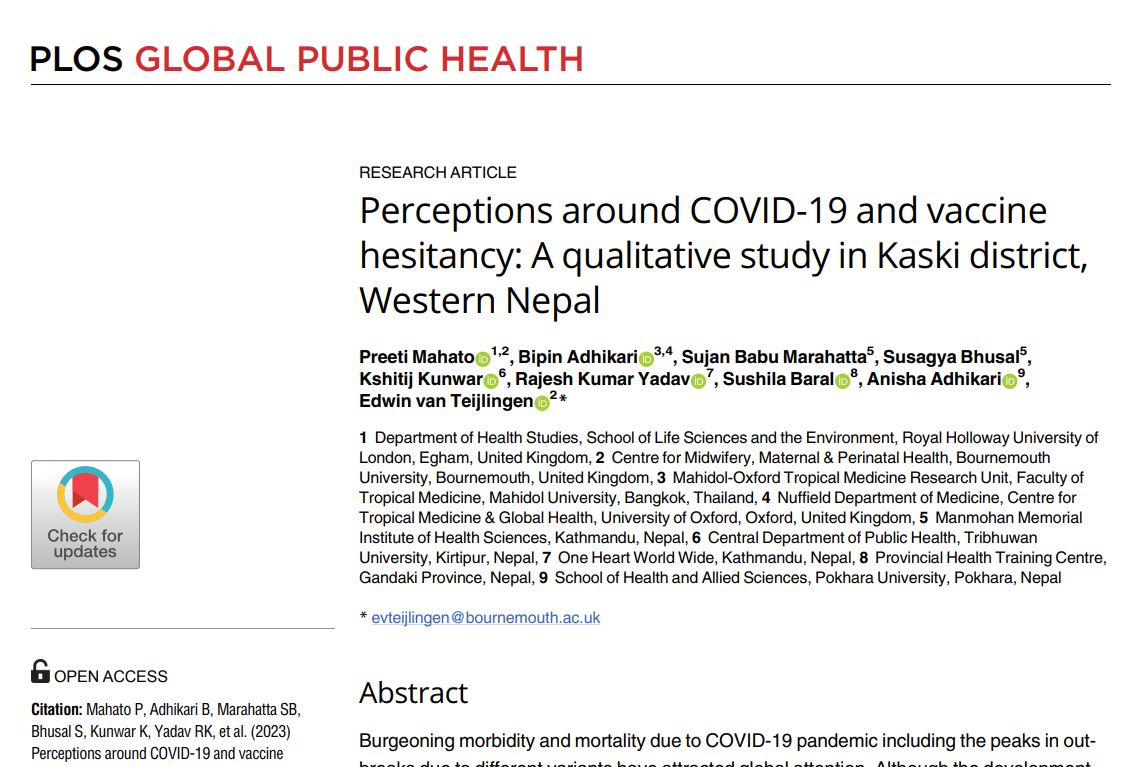
These Nepal Studies Days pay serious attention to our ongoing interdisciplinary study ‘The impact of federalisation on Nepal’s health system: a longitudinal analysis’ which was reported in several national newspapers in Nepal last week. Tomorrow there will be a plenary session by Prof. Simon Rushton, the PI on this project in which BU collaborates. He will be talking about ‘Nepal’s Health System During Federalisation: Emerging Issues and the Co-production of Policy and Practice Recommendations’. Later that day there will be two further presentations based on this large-scale study, the first one by Dr. Sharada P. Wasti followed by one delivered by Dr. Sujata Sapkota.
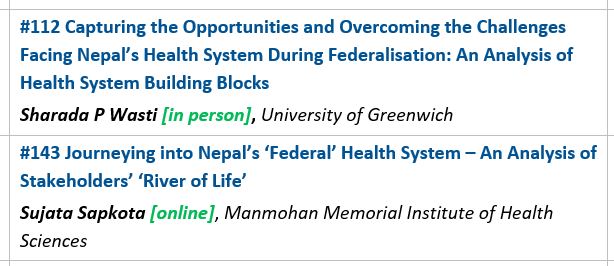
Extensive media coverage in Nepal last week
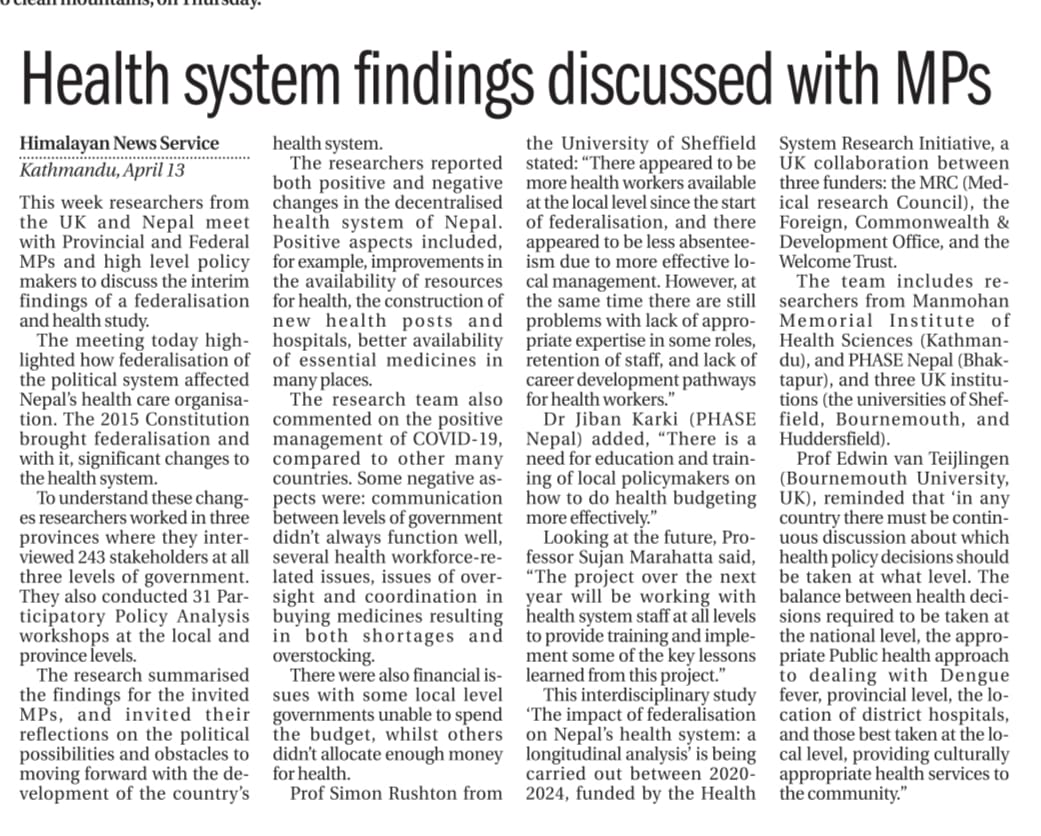 The interdisciplinary research project ‘The impact of federalisation on Nepal’s health system: a longitudinal analysis’ was reported in several national media in Nepal last week. This project running from 2020 to 2024 is, funded by the Health System Research Initiative, a UK collaboration between three funders: the MRC (Medical research Council), the Foreign, Commonwealth & Development Office, and the Welcome Trust.
The interdisciplinary research project ‘The impact of federalisation on Nepal’s health system: a longitudinal analysis’ was reported in several national media in Nepal last week. This project running from 2020 to 2024 is, funded by the Health System Research Initiative, a UK collaboration between three funders: the MRC (Medical research Council), the Foreign, Commonwealth & Development Office, and the Welcome Trust.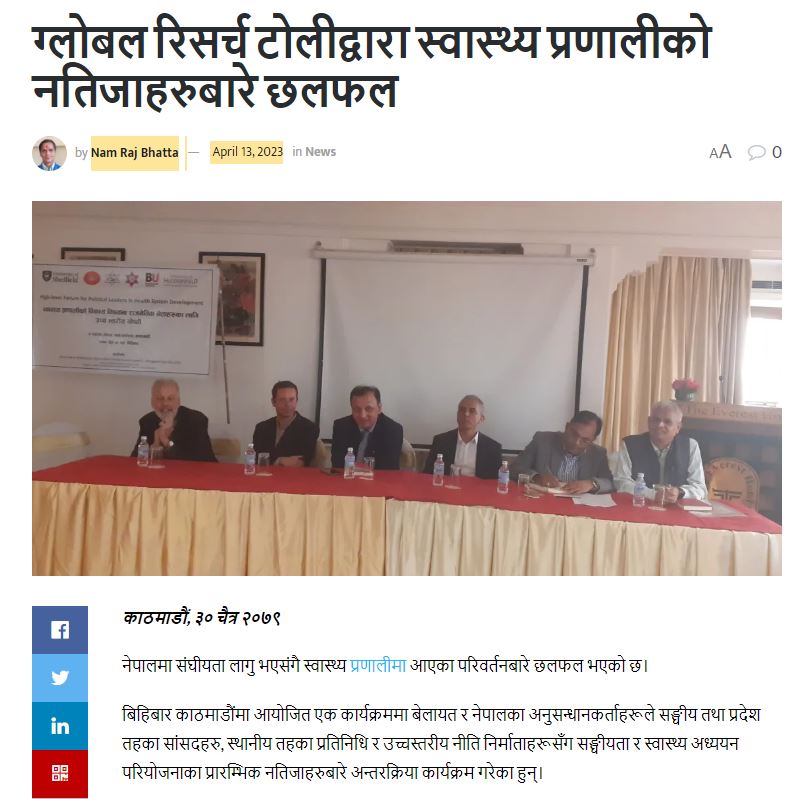
The 2015 Constitution brought federalisation and with it, significant changes to the health system. 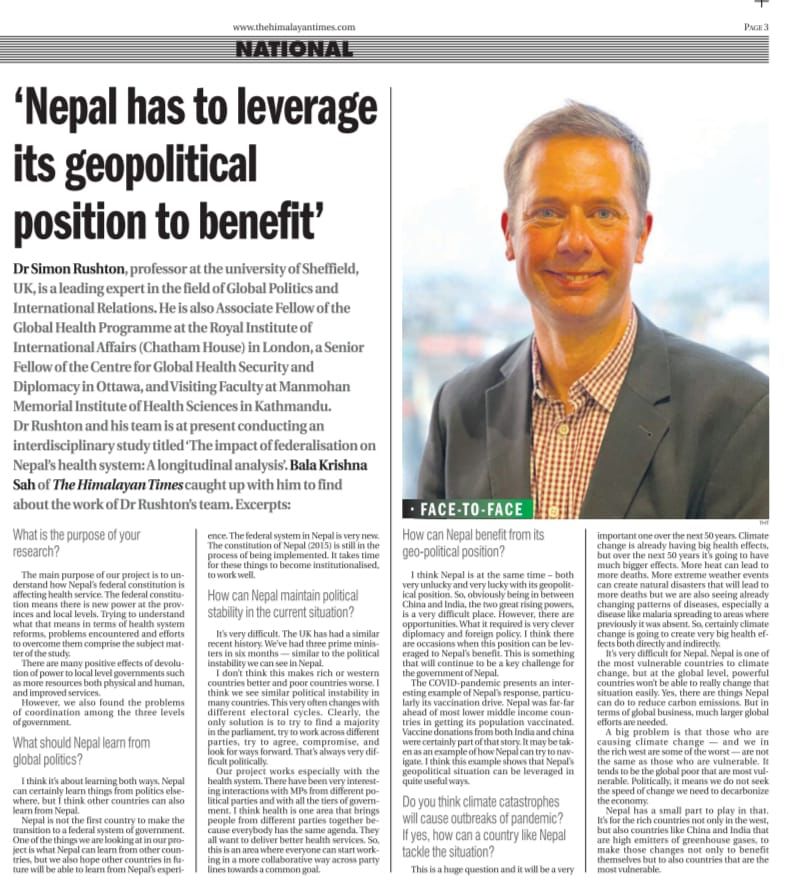 To understand these changes researchers worked in three provinces where they interviewed 243 stakeholders, at all three levels of government. They also conducted 31 Participatory Policy Analysis workshops at local and province levels. The team includes researchers from Manmohan Memorial Institute of Health Sciences (Kathmandu), and PHASE Nepal (Bhaktapur), and three UK institutions (the Universities of Sheffield, Bournemouth, and Huddersfield). It researchers from the UK and Nepal meet with Provincial and Federal MPs to discuss the interim findings of a federalisation and health study.
To understand these changes researchers worked in three provinces where they interviewed 243 stakeholders, at all three levels of government. They also conducted 31 Participatory Policy Analysis workshops at local and province levels. The team includes researchers from Manmohan Memorial Institute of Health Sciences (Kathmandu), and PHASE Nepal (Bhaktapur), and three UK institutions (the Universities of Sheffield, Bournemouth, and Huddersfield). It researchers from the UK and Nepal meet with Provincial and Federal MPs to discuss the interim findings of a federalisation and health study.
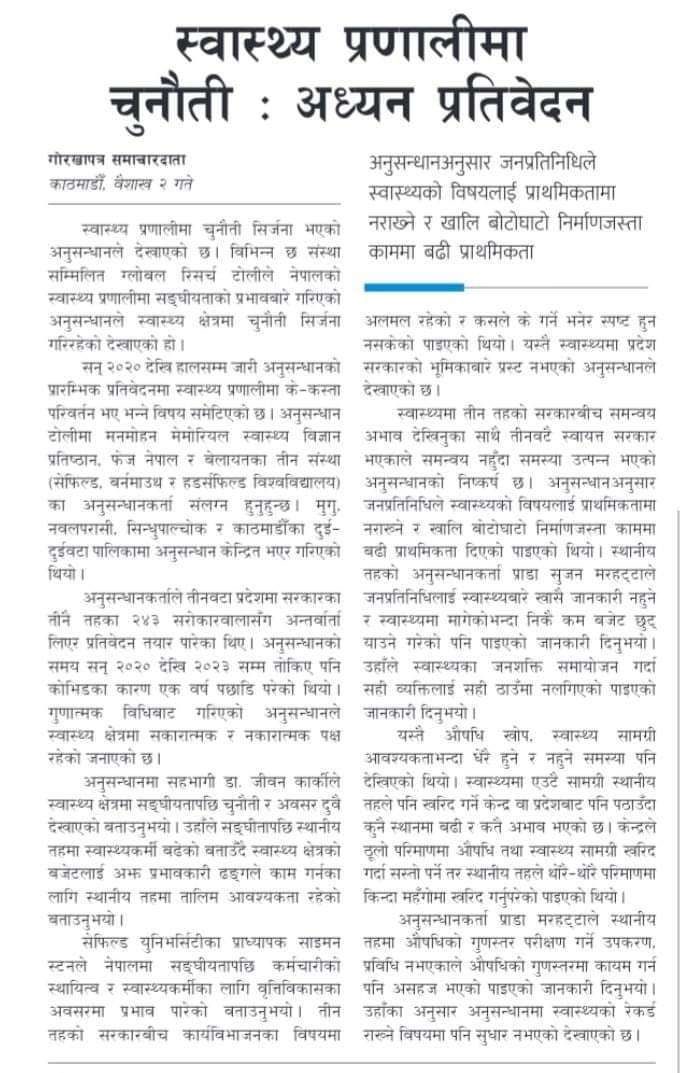
News articles appeared in national newspapers in Nepal, both in English and Nepali. The Nepali article appeared in the country’s oldest newspaper Gorkhapali, see copy here! Bournemouth University [Thank you Nathaniel Hobby and Stephen Bates] also publicized our press release on this project online. The journalist Nam Raj Bhatta published an item in the online Nepali-language newspaper NepalHealthOnline on April 13. The main meeting to discuss the interim findings of our project took place on Thursday 13 April an hotel close Nepal’s parliament. The interim results highlight how federalisation of the political system has affected Nepal’s health care organisation. The research team summarized the findings for the invited MPs and local and provincial political leaders, and invited their reflections on the political possibilities and obstacles to moving forward with the development of the country’s health system. The Himalayan Times published the article on top of this BU Research Blog as well as the special interview with the University of Sheffield based PI Prof. Simon Rushton.
Prof. Edwin van Teijlingen
Centre for Midwifery, Maternal & Perinatal Health
Double congratulations to Prof. Jonathan Parker
 Congratulations to Prof. Jonathan Parker, Professor of Society & Social Welfare in the Department of Social Sciences and Social Work, who just published his historical-sociological analysis of British Welfare under the title Analysing the History of British Social Welfare – Compassion, Coercion and Beyond. The book it is published by Policy Press and will be available next week. This book offers insights into the development of social welfare policies in Britain. By identifying continuities in welfare policy, practice and thought throughout history, it offers the potential for the development of new thinking, policy making and practice.
Congratulations to Prof. Jonathan Parker, Professor of Society & Social Welfare in the Department of Social Sciences and Social Work, who just published his historical-sociological analysis of British Welfare under the title Analysing the History of British Social Welfare – Compassion, Coercion and Beyond. The book it is published by Policy Press and will be available next week. This book offers insights into the development of social welfare policies in Britain. By identifying continuities in welfare policy, practice and thought throughout history, it offers the potential for the development of new thinking, policy making and practice.In addition Jonathan also published a new edition of his popular textbook Introducing Social Work SECOND EDITION. This edited volume included chapters by BU academics Dr. Orlanda Harvey (Chapter 26) and Dr. Sally Lee (Chapter 22) as well as an array of internationally renowned social work academics.
New publication Abier Hamadi, PhD student in FHSS
 Congratulations to Abier Hamidi on the acceptance of her Ph.D. paper ‘Facilitators and barriers to condom use in Middle East and North Africa: a systematic review’. [1] This review has been registered on PROSPERO. [2] The Journal of Public Health is part of BU’s publishing deal with Springer, hence it will free open access when published.
Congratulations to Abier Hamidi on the acceptance of her Ph.D. paper ‘Facilitators and barriers to condom use in Middle East and North Africa: a systematic review’. [1] This review has been registered on PROSPERO. [2] The Journal of Public Health is part of BU’s publishing deal with Springer, hence it will free open access when published.
Abier is supervised by Dr. Pramod Regmi, Senior Lecturer in International Health and the Global Engagement Lead in the Department of Nursing Sciences, and Prof. Edwin van Teijlingen in the Centre for Midwifery, Maternal & Perinatal Health (CMMPH). Earlier Abier published ‘HIV epidemic in Libya: Identifying gaps’ in 2021. [3]
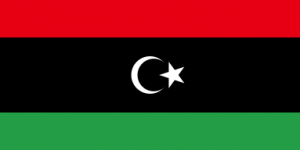
References:
- Hamidi, A., Regmi, P., van Teijlingen, E. (2023) Facilitators and barriers to condom use in Middle East and North Africa: a systematic review, Journal of Public Health, (accepted)
- Hamidi, A., van Teijlingen, E., Regmi, P. (2021) Facilitators and barriers to condom use in Middle East and North Africa: a systematic review. PROSPERO CRD42021297160
- Hamidi, A., Regmi, P., van Teijlingen, E. (2021) HIV epidemic in Libya: Identifying gaps, Journal of the International Association of Providers of AIDS Care, 20 :1-5 https://doi.org/10.1177/23259582211053964 .
HealthBus to present at Community Voices webinar Wednesday April 12th 12-1pm
This month’s Webinar welcomes Bels Wathen from HealthBus. The HealthBus Trust is a charity that provides accessible and appropriate healthcare to people experiencing homelessness in Bournemouth and the surrounding areas. The Trust operates a mobile, GP-led service in close relationship with a multidisciplinary team and other providers of homeless services.
Bels will share details about the HealthBus Trust, and her involvement in coordinating volunteers, managing projects and supporting the clinical team by taking the mobile clinic to designated sites across Bournemouth
Community voices is a collaboration between BU PIER partnership and Centre for Seldom Heard Voices to provide a platform and a voice to local community activists.
Please do join us for this webinar….
Microsoft Teams meeting
Join on your computer, mobile app or room device
Click here to join the meeting
Meeting ID: 386 758 891 002
Passcode: kzfdY9
Download Teams | Join on the web
Applying FUSION in Bangladesh
Late in 2022 we started a new interdisciplinary study funded by the UK National Institute for Health and Care Research (NIHR). The research aims to reduce the deaths of newly-mobile toddlers from drowning in rural Bangladesh. This project called Sonamoni is being co-ordinated by Bournemouth University in collaboration with the University of the West of England, Bristol, the University of Southampton, the Poole-based Royal National Lifeboat Institution (RNLI) and the Centre for Injury Prevention and Research, Bangladesh (CIPRB).
In Bangladesh, drowning is the leading cause of death in children between one and two years old. This low-income country has one of the highest rates of drowning, especially among children in the world. The risk of drowning in rural areas is twice that in cities, because there are significant numbers of ponds and ditches, creating natural drowning hazards for very young children. CIPRB has implemented several effective drowning prevention solutions focused on children over the past 15 years, including a successful daycare model to keep young children safely away from water. However, enrollment and attendance rates for children under two years (those at the highest risk of accidental drowning) have been low.
 The team will be working with communities to apply human-centred design techniques in Bangladesh. Together they will identify and prioritise potential solutions, develop prototype interventions, and assess the acceptability and usability of proposed interventions.
The team will be working with communities to apply human-centred design techniques in Bangladesh. Together they will identify and prioritise potential solutions, develop prototype interventions, and assess the acceptability and usability of proposed interventions.
This research is an excellent example of BU’s FUSION. BU endeavours to bring together Research, Education and Practice to create something that is greater than the sum of its parts. FUSION is central to our Bangladesh project, the Research is focusing on social sciences and public health, the Education is around health education of people in rural communities as well as training of the research team members, whilst Practice will be the outcome of the human-centred design approach, when we test the best interventions. 
The £1.6m project has been made possible thanks to a grant from the NIHR through their Research and Innovation for Global Health Transformation programme. For more information, visit the NIHR website. NIHR uses aid from the UK government to support global health research.
Prof. Edwin van Teijlingen
CMMPH (Centre for Midwifery, Maternal & Perinatal Health)
Setting up a longitudinal health & lifestyle study in Nepal

The Nepal Family Cohort Study (NeFCoS) is a multidisciplinary cohort study into the prevalence, incidence, and determinants of various diseases from childhood to adulthood in children and their parents for over two decades. NeFCoS is a longitudinal study which recently started collecting health and well-being data, and which will collect data repeatedly from the same individuals at certain intervals for years to come. Our primary focus is understanding the multiple risk factors of health conditions in children and their families, early diagnosis of diseases, and prevention and management of diseases through effective intervention. The team aims to this by examining associations between exposure to known or suspected causes of disease, so-called risk factors and subsequent morbidity and mortality.
Our large international team is led by Dr. Om Kurmi, Associate Professor and Respiratory and Environmental Epidemiologist at Coventry University in the UK, and associated with McMaster University, Canada. The Bournemouth University team comprises Dr. Pramod Regmi (Senior Lecturer in International Health), Dr. Edwin van Teijlingen (Professor of Reproductive Health), and Dr. Vanora Hundley (Professor of Midwifery).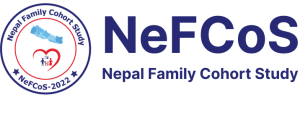
The team is currently recruiting six-to-nine-year-old children and their parents who have provided written consent to participate. The parents offer information on socio-demographics, lifestyle factors, dietary habits, occupational history, educational history, environmental conditions at home and outside, physical activities and any diseases they or their children have had since birth. They also undergo a series of measurements such as lung function, oxygen saturation, blood pressure, hand-grip strength, anthropometry, body fat percentage, muscle mass, body water content and skin-fold thickness as an indirect measure for malnutrition. The study is also measuring eleven different parameters in spot urine samples semi-quantitatively and plan to collect the biological specimen in future follow-ups studies. The study is currently being conducted in two regions of Nepal in the south, the Terai and in the more central hill part of the country, with plans to expand to extend to other provinces of Nepal in the future.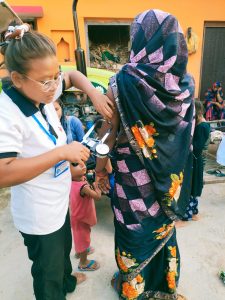
The baseline study is ongoing. So far, the team has collected over 4250 participants’ data from both study sites. We plan to complete the baseline data by the end of December 2023 with about 15,000 participants from the two regions. Our study is urgently needed in Nepal as it will provide valuable information for evidence-based decision-making regarding disease prevention and management along with changing policy.
Prof. Edwin van Teijlingen
Centre for Midwifery, Maternal & Perinatal Health (CMMPH)
Reminder: International Care Network to present at Community Voices webinar March 8th 12-1pm
March’s webinar welcomes Rachael Sawers from International Care Network. ICN is a local charity providing support and advice services to refugees, asylum-seekers and vulnerable migrants in the BCP and Dorset LA areas. Rachael manages the Resettlement Support services (working with Syrian, Afghan and Ukrainian families) as well as coordinating community activities for vulnerable women and their families, such as conversation groups, English lessons, homework clubs and key working.
Community voices is a collaboration between BU PIER partnership and Centre for Seldom Heard Voices to provide a platform and a voice to local community activists.
Please do join us for this webinar….
Microsoft Teams meeting
Join on your computer, mobile app or room device
Click here to join the meeting
Meeting ID: 386 758 891 002
Passcode: kzfdY9
New paper on COVID-19 and vaccine hesitancy in Western Nepal
 This weekend saw the publication of our paper ‘ Perceptions around COVID-19 and vaccine hesitancy: A qualitative study in Kaski district, Western Nepal’ in the international journal PLOS Global Public Health. [1] This paper reports on a qualitative in-depth study comprising nineteen interviews in the city of Pokhara and its surrounding rural areas. In the interviews people expressed fears about COVID-19, and adherence to public health measures such as social distancing and warring masks. The interviewees generally saw the COVID-19 vaccine as solution but mentioned the vaccine’s potential lack of effectiveness, the uncertain duration of protection and its side-effects.
This weekend saw the publication of our paper ‘ Perceptions around COVID-19 and vaccine hesitancy: A qualitative study in Kaski district, Western Nepal’ in the international journal PLOS Global Public Health. [1] This paper reports on a qualitative in-depth study comprising nineteen interviews in the city of Pokhara and its surrounding rural areas. In the interviews people expressed fears about COVID-19, and adherence to public health measures such as social distancing and warring masks. The interviewees generally saw the COVID-19 vaccine as solution but mentioned the vaccine’s potential lack of effectiveness, the uncertain duration of protection and its side-effects.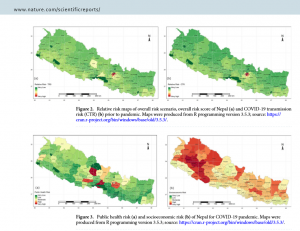
This paper adds to a growing volume of public health papers on COVID-19 in Nepal or Nepalese people living in the UK written by Bournemouth University academics. [2-11] These papers are co-authored with colleagues based in Nepal and in the UK. They include Nepalese academics based at the University of Sheffield, Royal Holloway, the University of Huddersfield, The University of Greenwich
Prof. Edwin van Teijlingen
Centre for Midwifery, Maternal & Perinatal Health
References:
- Mahato P., Adhikari B., Marahatta S.B., Bhusal S., Kunwar K., Yadav R.K., Baral, S., Adhikari, A., van Teijlingen, E. (2023) Perceptions around COVID-19 and vaccine hesitancy: A qualitative study in Kaski district, Western Nepal. PLOS Global Public Health 3(2): e0000564. https://doi.org/10.1371/journal.pgph.0000564
- Sharma, M., Adhikari, R., van Teijlingen, E. (2022) Handwashing station in Nepal: Role of wealth status in establishing a handwashing station, World Medical & Health Policy Online first https://doi.org/10.1002/wmh3.523
- Simkhada, P., Tamang, P., Timilsina, L., Simkhada, B., Bissell, P., van Teijlingen, E., Sah, S.K., Wasti, S.P. (2022) Factors Influencing COVID-19 Vaccine Uptake among Nepali in the UK: A Qualitative Study, Vaccine 10(5): 780. https://doi.org/10.3390/vaccines10050780
- Regmi, P., Dhakal Adhikari, S., Aryal, N., Wasti, S.P., van Teijlingen, E. (2022) Fear, Stigma and Othering: The Impact of COVID-19 Rumours on Returnee Migrants and Muslim Populations of Nepal, International Journal of Environmental Research & Public Health 19(15), 8986; https://doi.org/10.3390/ijerph19158986
- Khanal, S.P., van Teijlingen, E., Sharma, M.K., Acharya, J., Sharma, C. (2021) Perceived threats towards COVID-19 pandemic among Nepali migrant workers returned from India, Journal of Health Promotion 9(1):87-99.
- Simkhada, P., Mahato, P., Tamang, P., van Teijlingen, E., Shahi, P. (2020) The Role of Health Promotion during the COVID-19 Pandemic. Journal of Health Promotion, 8:1-4. https://doi.org/10.3126/jhp.v8i0.32964
- Parajuli, R.R., Mishra, B., Banstola, A., Ghimire, B.R., Poudel, S., Sharma, K., Dixit, S.M., Shah, S., Simkhada, P., van Teijlingen, E. (2020) Multidisciplinary Approach to COVID-19 Risk Communication: A Framework and Tool for Individual & Regional Risk Assessment. Scientific Reports 10: 21650 https://www.nature.com/articles/s41598-020-78779-0 .
- Tamang, P., Mahato, P., Simkhada P., Bissell, P., van Teijlingen, E. (2021) Pregnancy, Childbirth, Breastfeeding and Coronavirus Disease: What is known so far? Journal of Midwifery Association of Nepal (JMAN) 2(1): 96-101.
- Adhikary, P., Balen, J., Gautam, S., Ghimire, S., Karki, J., Lee, A.C.K., Marahatta, S.B., Panday, S., Pohl, G., Rushton, S., Sapkota, S., Simkhada, P.P., Subedi, M., van Teijlingen, E. for the Nepal Federal Health System team (2020) The COVID-19 pandemic in Nepal: Emerging evidence on the effectiveness of action by, and cooperation between, different levels of government in a federal system, Journal of Karnali Academy of Health Sciences 3 (3): 1-11.
- Mahato, P., Tamang, P., Shahi, P., Aryal, N., Regmi, P., van Teijlingen, E., Simkhada, P. (2020) Effects of COVID-19 during lockdown in Nepal, Europasian Journal of Medical Sciences 2(2):1-5.
- Tamang, P., Mahato, P., Shahi, P., Simkhada, P., van Teijlingen, E., Amgain, K. (2020) COVID-19 Quarantine: A Key Part of Prevention in Nepal. Journal of Karnali Academy of Health Sciences 3(1):1-14.
British Academy Writing Workshop in Nepal in 2022
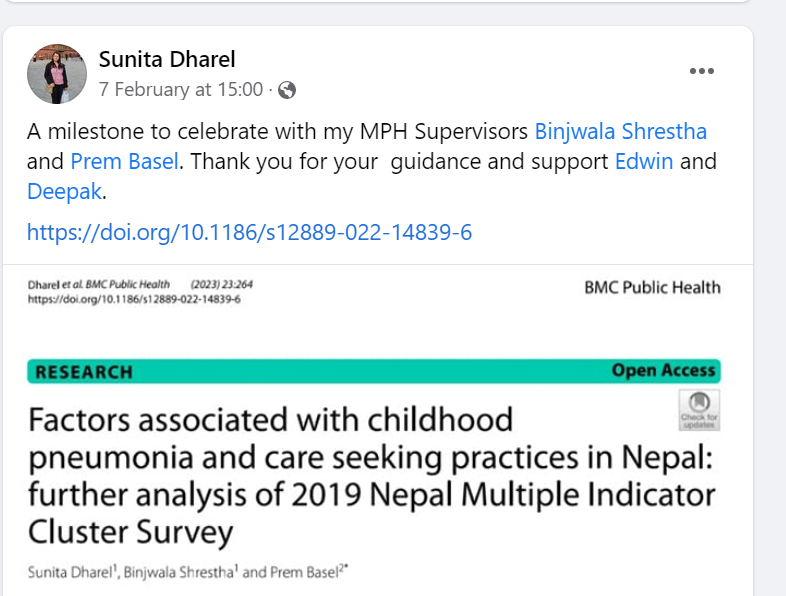 Two days ago one of the participants of our British Academy funded Academic Writing Workshops announced on Facebook that the paper, we had helped her put together, had been published in a peer-reviewed journal. It is satisfying to see the fruits of our labours in print following two sets of three-day workshops in Kathmandu and Pokhara. The team running the 2022 workshop comprised three Faculty of Health & Social Sciences’ (FHSS) staff: Dr. Shovita Dhakal Adhikari, Dr. Pramod Regmi, and Prof. Edwin van Teijlingen, and our colleague Dr. Rashmee Rajkarnikar at Nepal’s oldest and largest university (Tribhuvan University) and BU’s Visiting Faculty Dr. Emma Pitchforth, who is Senior Lecturer and Senior Research Fellow in Primary Care at the University of Exeter. Dr. Shovita Adhikari has since left Bournemouth University to become Senior Lecturer in Criminology & Sociology at London Metropolitan University.
Two days ago one of the participants of our British Academy funded Academic Writing Workshops announced on Facebook that the paper, we had helped her put together, had been published in a peer-reviewed journal. It is satisfying to see the fruits of our labours in print following two sets of three-day workshops in Kathmandu and Pokhara. The team running the 2022 workshop comprised three Faculty of Health & Social Sciences’ (FHSS) staff: Dr. Shovita Dhakal Adhikari, Dr. Pramod Regmi, and Prof. Edwin van Teijlingen, and our colleague Dr. Rashmee Rajkarnikar at Nepal’s oldest and largest university (Tribhuvan University) and BU’s Visiting Faculty Dr. Emma Pitchforth, who is Senior Lecturer and Senior Research Fellow in Primary Care at the University of Exeter. Dr. Shovita Adhikari has since left Bournemouth University to become Senior Lecturer in Criminology & Sociology at London Metropolitan University.
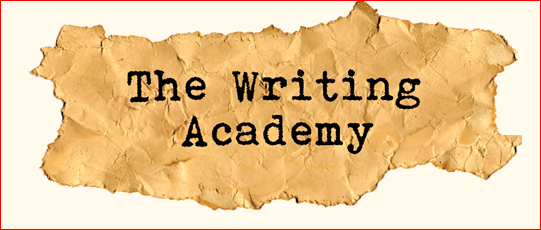 Over the years our team has published a wide range of papers on many aspects of academic writing [1-38]. The authors include: Prof. Vanora Hundley [3-5,8-9,14,16-19,21,23,28-33,36], Dr. Orlanda Harvey [2,22, ], Dr. Pramod Regmi [2,7,13-14,17,22,24-25 ], Dr. Rachel Arnold [20], Dr. Alison Taylor, Dr. Nirmal Aryal [14,24], Prof. Edwin van Teijlingen, PhD student Mrs. Sulochana Dhakal-Rai [8] all in FHSS, Prof. Ann Luce in the Media School [5] and Dr. Shanti Shanker in the Department of Psychology [6] as well as several BU Visiting Faculty: Dr. Brijesh Sathian [1,7-8,21,31,34], Dr. Shovita Dhakal Adhiikari [24-25 ], Dr. Preeti Mahato [11,20, ], Prof. Padam Simkhada [3-4,6,8-9,13,16-19,21,23,25-31,34 ], Dr. Emma Pitchforth [11-12,37], Prof. Bhimsen Devkota [12,16 ], Prof. Sujan Marahatta [7], Dr. Bibha Simkhada [9,14,25,27,29] and Ms. Jillian Ireland [8,20,22,27,31].
Over the years our team has published a wide range of papers on many aspects of academic writing [1-38]. The authors include: Prof. Vanora Hundley [3-5,8-9,14,16-19,21,23,28-33,36], Dr. Orlanda Harvey [2,22, ], Dr. Pramod Regmi [2,7,13-14,17,22,24-25 ], Dr. Rachel Arnold [20], Dr. Alison Taylor, Dr. Nirmal Aryal [14,24], Prof. Edwin van Teijlingen, PhD student Mrs. Sulochana Dhakal-Rai [8] all in FHSS, Prof. Ann Luce in the Media School [5] and Dr. Shanti Shanker in the Department of Psychology [6] as well as several BU Visiting Faculty: Dr. Brijesh Sathian [1,7-8,21,31,34], Dr. Shovita Dhakal Adhiikari [24-25 ], Dr. Preeti Mahato [11,20, ], Prof. Padam Simkhada [3-4,6,8-9,13,16-19,21,23,25-31,34 ], Dr. Emma Pitchforth [11-12,37], Prof. Bhimsen Devkota [12,16 ], Prof. Sujan Marahatta [7], Dr. Bibha Simkhada [9,14,25,27,29] and Ms. Jillian Ireland [8,20,22,27,31].References:
- Sathian B, van Teijlingen E, Banerjee I, Kabir R. (2022) Guidance to applying for health research grants in the UK. Nepal J Epidemiol 12(4):1231-1234.
- Harvey, O., Taylor, A., Regmi, P.R., van Teijlingen, E. (2022) Struggling to reply to reviewers: Some advice for novice researchers. Health Prospect, 21(2):19-22.
- van Teijlingen, E., Hundley, V., Simkhada, P.P., Wasti, S.P. (2022) Introduction, In: Wasti, S.P., et al. (Eds.) Academic Writing and Publishing in Health & Social Sciences, Kathmandu, Nepal: Himal Books: 1-4.
- Simkhada, P., van Teijlingen, E., Hundley, V., Swoveet, P. (2022) Writing an Academic Paper, In: Wasti, S.P., et al. (Eds.) Academic Writing and Publishing in Health & Social Sciences, Kathmandu, Nepal: Himal Books: 6-14.
- Hundley, V., Luce, A., Simkhada, P., van Teijlingen, E. (2022) Collaborative Writing for Publication, In: Wasti, S.P., et al. (Eds.) Academic Writing and Publishing in Health & Social Sciences, Kathmandu, Nepal: Himal Books: 15-19.
- van Teijlingen, E., Simkhada, P., Shanker, S. (2022) Selecting an Appropriate Journal and Submitting your Paper, In: Wasti, S.P., et al. (Eds.) Academic Writing and Publishing in Health & Social Sciences, Kathmandu, Nepal: Himal Books: 20-31.
- van Teijlingen, E., Thapa, D., Marahatta, S.B., Sapkota, J.L., Regmi, P. Sathian, B. (2022) Editors and Reviewers: Roles and Responsibilities, In: Wasti, S.P., et al. (Eds.) Academic Writing and Publishing in Health & Social Sciences, Kathmandu, Nepal: Himal Books: 32-37.
- van Teijlingen, E., Ireland, J., Hundley, V, Dhakal Rai, S., Simkhada, P., Sathian, B. (2022) Identifying an appropriate Title, In: Wasti, S.P., et al. (Eds.) Academic Writing and Publishing in Health & Social Sciences, Kathmandu, Nepal: Himal Books: 39-47.
- Simkhada, P., van Teijlingen, E., Hundley, V., Simkhada, B, Acharya D.R. (2022) Writing an Abstract for a Scientific Conference, In: Wasti, S.P., et al. (Eds.) Academic Writing and Publishing in Health & Social Sciences, Kathmandu, Nepal: Himal Books: 48-56.
- Subedi, M., van Teijlingen, E., Baniya J., Sijapati, B. (2022) Writing the Introduction and Background, In: Wasti, S.P., et al. (Eds.) Academic Writing and Publishing in Health & Social Sciences, Kathmandu, Nepal: Himal Books: 57-67.
- van Teijlingen, E., Pitchforth, E., Keenan Forrest, K., Mahato, P. (2022) Writing a Qualitative Paper, In: Wasti, S.P., et al. (Eds.) Academic Writing and Publishing in Health & Social Sciences, Kathmandu, Nepal: Himal Books: 88-97.
- Wasti, S.P, Devkota, B., Bhatta, D.N., Pitchforth, E., van Teijlingen, E. (2022) Writing the Introduction and Background, In: Wasti, S.P., et al. (Eds.) Academic Writing and Publishing in Health & Social Sciences, Kathmandu, Nepal: Himal Books: 112-120.
- Regmi, P., van Teijlingen, E., Simkhada, P. (2022) Writing up the Discussion, Conclusion and Recommendations, In: Wasti, S.P., et al. (Eds.) Academic Writing and Publishing in Health & Social Sciences, Kathmandu, Nepal: Himal Books: 121-129
- Aryal, N., Regmi, P.R., Simkhada, B., Subedi, M., van Teijlingen, E., Wasti, S.P., Hundley, V, Khatri, R. (2022) Being Ethical in Writing and Publishing, In: Wasti, S.P., et al. (Eds.) Academic Writing and Publishing in Health & Social Sciences, Kathmandu, Nepal: Himal Books: 153-161.
- van Teijlingen, E., Venter, K. (2022) Writing a Book Review, In: Wasti, S.P., et al. (Eds.) Academic Writing and Publishing in Health & Social Sciences, Kathmandu, Nepal: Himal Books: 162-167.
- Devkota, B., Simkhada, P., van Teijlingen, E., Hundley, V, Wasti, S.P. (2022) Writing a Research Proposal, In: Wasti, S.P., et al. (Eds.) Academic Writing and Publishing in Health & Social Sciences, Kathmandu, Nepal: Himal Books: 168-175.
- Wasti, S.P. Regmi, P.R., Simkhada, P., van Teijlingen, E., Hundley, V. (2022) Writing a PhD Proposal, In: Wasti, S.P., et al. (Eds.) Academic Writing and Publishing in Health & Social Sciences, Kathmandu, Nepal: Himal Books: 176-183.
- Hundley, V., Simkhada, P., van Teijlingen, E. (2022) Converting your Master’s or Doctoral Thesis into an Academic Paper for Publication, In: Wasti, S.P., et al. (Eds.) Academic Writing and Publishing in Health & Social Sciences, Kathmandu, Nepal: Himal Books: 184-189.
- van Teijlingen, E., Hundley, V., Simkhada, P., Acharya, J., Silwal, R.C., Wasti, S.P. (2022) Academic Writing: Final Thoughts, In: Wasti, S.P., et al. (Eds.) Academic Writing and Publishing in Health & Social Sciences, Kathmandu, Nepal: Himal Books: 201-20
- Arnold, R., Ireland, J., Mahato, P., van Teijlingen, E. (2022) Writing and publishing a reflective paper: Three case studies, Welhams Acad J 1(1): 4-11.
- van Teijlingen, E., Hundley, V, Sathian, B., Simkhada, P., Robinson, J., Banerjee, I. (2022) The Art of the Editorial Nepal J Epidemiol, 12(1): 1135–38.
- Harvey, O., van Teijlingen, A., Regmi, P.R., Ireland, J., Rijal, A., van Teijlingen, E.R. (2022) Co-authors, colleagues, and contributors: Complexities in collaboration and sharing lessons on academic writing Health Prospect 21(1):1-3.
- Wasti, S.P., van Teijlingen, E., Simkhada, P., Hundley, V. with Shreesh, K. (2022) Writing and Publishing Academic Work, Kathmandu, Nepal: Himal Books
- van Teijlingen, E.R., Dhakal Adhikari, S., Regmi, P.R., van Teijlingen, A., Aryal, N., Panday, S. (2021). Publishing, identifiers & metrics: Playing the numbers game. Health Prospect, 20(1). https://doi.org/10.3126/hprospect.v20i1.37391
- Adhikari, S. D., van Teijlingen, E. R., Regmi, P. R., Mahato, P., Simkhada, B., & Simkhada, P. P. (2020). The Presentation of Academic Self in The Digital Age: The Role of Electronic Databases. Int J Soc Sci Management, 7(1), 38-41. https://doi.org/10.3126/ijssm.v7i1.27405
- van Teijlingen, E, Simkhada, PP, Rizyal A (2012) Submitting a paper to an academic peer-reviewed journal, where to start? (Guest Editorial) Health Renaissance 10(1): 1-4.
- van Teijlingen, E, Simkhada. PP, Simkhada, B, Ireland J. (2012) The long & winding road to publication, Nepal J Epidemiol 2(4): 213-215 http://nepjol.info/index.php/NJE/article/view/7093/6388
- Hundley, V, van Teijlingen, E, Simkhada, P (2013) Academic authorship: who, why and in what order? Health Renaissance 11(2):98-101 www.healthrenaissance.org.np/uploads/Download/vol-11-2/Page_99_101_Editorial.pdf
- Simkhada, P., van Teijlingen E., Hundley, V., Simkhada, BD. (2013) Writing an Abstract for a Scientific Conference, Kathmandu Univ Med J 11(3): 262-65. http://www.kumj.com.np/issue/43/262-265.pdf
- Simkhada P, van Teijlingen E, Hundley V. (2013) Writing an academic paper for publication, Health Renaissance 11(1):1-5. www.healthrenaissance.org.np/uploads/Pp_1_5_Guest_Editorial.pdf
- van Teijlingen, E., Ireland, J., Hundley, V., Simkhada, P., Sathian, B. (2014) Finding the right title for your article: Advice for academic authors, Nepal J Epidemiol 4(1): 344-347.
- van Teijlingen E., Hundley, V., Bick, D. (2014) Who should be an author on your academic paper? Midwifery 30: 385-386.
- Hall, J., Hundley, V., van Teijlingen, E. (2015) The journal editor: friend or foe? Women & Birth 28(2): e26-e29.
- Sathian, B., Simkhada, P., van Teijlingen, E., Roy, B, Banerjee, I. (2016) Grant writing for innovative medical research: Time to rethink. Med Sci 4(3):332-33.
- Pradhan, AK, van Teijlingen, ER. (2017) Predatory publishing: a great concern for authors, Med Sci 5(4): 43.
- van Teijlingen, E, Hundley, V. (2002) Getting your paper to the right journal: a case study of an academic paper, J Advanced Nurs 37(6): 506-11.
- Pitchforth, E, Porter M, Teijlingen van E, Keenan Forrest, K. (2005) Writing up & presenting qualitative research in family planning & reproductive health care, J Fam Plann Reprod Health Care 31(2): 132-135.
- van Teijlingen, E (2004), Why I can’t get any academic writing done, Medical Sociol News 30(3): 62-63. britsoc.co.uk/media/26334/MSN_Nov_2004.pdf
NIHR Grant Applications Seminar ONLINE – 22nd March 2023


Dear colleagues
– Do you have a great idea for research in health, social care or public health?
– Are you planning to submit a grant application to NIHR?
Our popular seminar continues online and will next take place on Wednesday 22nd March 2023 from 10.00am – 12.30pm.
The seminar provides an overview of NIHR funding opportunities and research programme remits, requirements and application processes. We will give you top tips for your application and answer specific questions with experienced RDS South West advisers.
We will also be hearing from Professor Mike Robling about the NIHR Policy Research Programme (PRP) . He will be giving an overview of the programme, the assessment process and what the funding panels are looking for.
We also have a limited number of 20-minute 1-to-1 appointments available after the seminar should you wish to discuss your proposed study with an RDS adviser.
Find out more and book a place.
Your local branch of the NIHR RDS (Research Design Service) is based within the BU Clinical Research Unit (BUCRU)
We can help with your application. We advise on all aspects of developing an application and can review application drafts as well as put them to a mock funding panel (run by RDS South West) known as Project Review Committee, which is a fantastic opportunity for researchers to obtain a critical review of a proposed grant application before this is sent to a funding body.
Contact us as early as possible to benefit fully from the advice
Feel free to call us on 01202 961939 or send us an email.
New sociology paper led by Dr. Orlanda Harvey
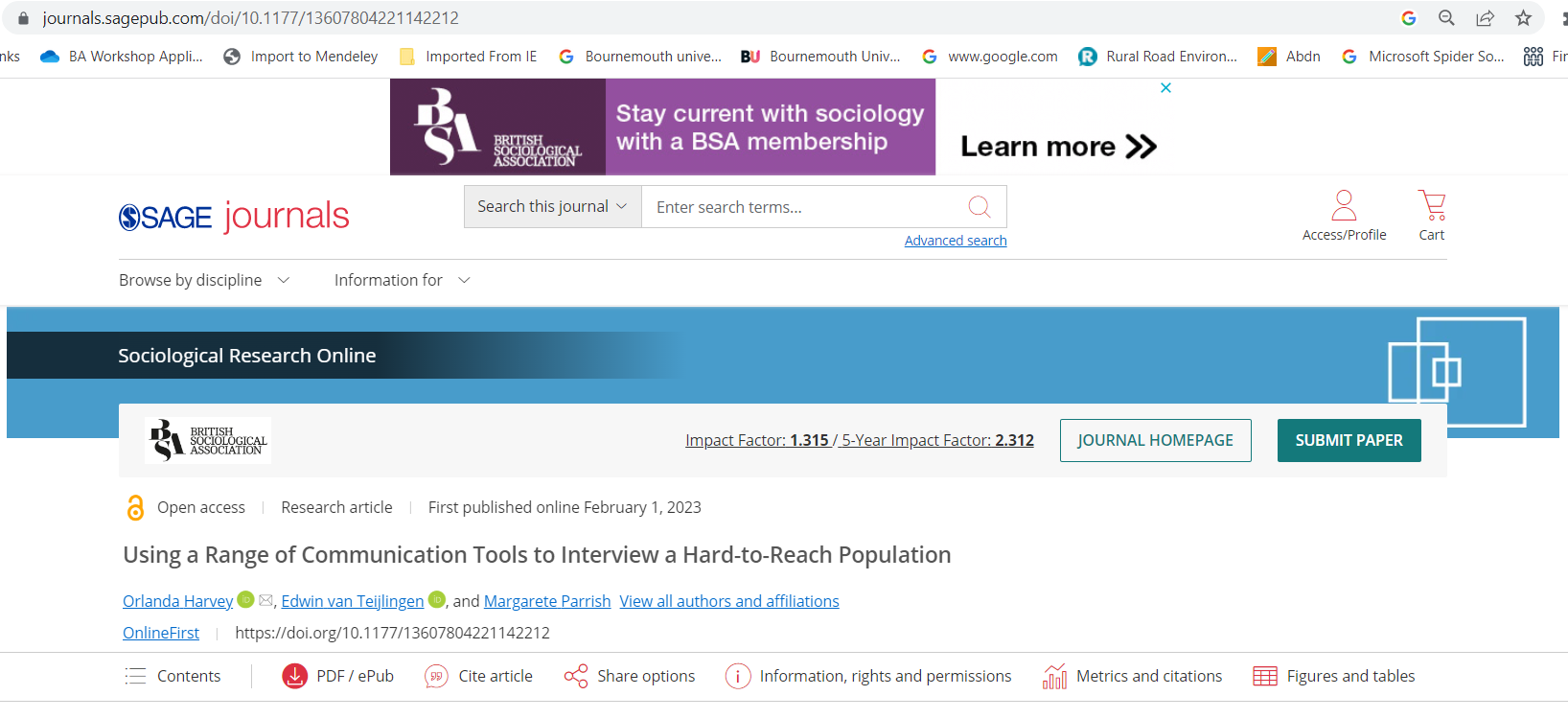 Congratulations to Dr. Orlanda Harvey and Dr. Margarete Parrish in the Department of Social Sciences & Social Work on the publication of our article “Using a Range of Communication Tools to Interview a Hard-to-Reach Population” in Sociological Research Online [1]. The paper highlights that online communication tools are increasingly being used by researchers; hence it is timely to reflect on the differences when using a broad range of data collection methods. Using a case study with a potentially hard-to-reach substance-using population who are often distrustful of researchers, this article explores the use of a variety of different platforms for interviews. It highlights both the advantages and disadvantages of each method. Face-to-face interviews and online videos offer more opportunity to build rapport, but lack anonymity. Live Webchat and audio-only interviews offer a high level of anonymity, but both may incur a loss of non-verbal communication, and in the Webchat a potential loss of personal narrative. This article is intended for sociologists who wish to broaden their methods for conducting research interviews.
Congratulations to Dr. Orlanda Harvey and Dr. Margarete Parrish in the Department of Social Sciences & Social Work on the publication of our article “Using a Range of Communication Tools to Interview a Hard-to-Reach Population” in Sociological Research Online [1]. The paper highlights that online communication tools are increasingly being used by researchers; hence it is timely to reflect on the differences when using a broad range of data collection methods. Using a case study with a potentially hard-to-reach substance-using population who are often distrustful of researchers, this article explores the use of a variety of different platforms for interviews. It highlights both the advantages and disadvantages of each method. Face-to-face interviews and online videos offer more opportunity to build rapport, but lack anonymity. Live Webchat and audio-only interviews offer a high level of anonymity, but both may incur a loss of non-verbal communication, and in the Webchat a potential loss of personal narrative. This article is intended for sociologists who wish to broaden their methods for conducting research interviews.
This methods article was developed based on the recruitment issues faced during Orlanda’s PhD research from which she has published several previous papers [2-6].
Prof. Edwin van Teijlingen
CMMPH
References:
- Harvey, O., van Teijlingen, E., Parrish, M. (2023) Using a Range of Communication Tools to Interview a Hard-to-Reach Population. Sociological Research Online [online first]
- Harvey, O., Keen, S., Parrish, M., van Teijlingen, E. (2019) Support for people who use Anabolic Androgenic Steroids: A Systematic Literature Review into what they want and what they access. BMC Public Health 19: 1024
- Harvey, O., Parrish, M., van Teijlingen, E., Trenoweth, S. (2020) Support for non-prescribed Anabolic Androgenic Steroids users: A qualitative exploration of their needs Drugs: Education, Prevention & Policy 27:5, 377-386. doi 10.1080/09687637.2019.1705763
- Harvey, O., Parrish, M., van Teijlingen, E, Trenoweth, S. (2022) Libido as a reason to use non-prescribed Anabolic Androgenic Steroids, Drugs: Education, Prevention & Policy 29(3):276-288.
- Harvey, O., van Teijlingen, E., Parrish, M. (2022) Mixed-methods research on androgen abuse – a review, Current Opinion in Endocrinology & Diabetes 29(6):586-593.
- Harvey, O., van Teijlingen, E. (2022) The case for ‘anabolics’ coaches: selflessness versus self-interest? Performance Enhancement & Health 10(3) August, 100230
NIHR Bulletin

RDS NEWS
NIHR Grant Applications Seminar and Support event
Our popular seminar continues online and will next take place in March 2023. Watch this space for further details.
In the meantime, you can register your interest with us and once details of the event are available, you will receive an email with a weblink to find out more.
Alternatively, you can contact our Coordinating Centre on 01392 726724 or rds.sw@nihr.ac.uk, or your local RDS office to find out more.
NIHR News
Experimental treatments for cancer receive funding boost
The NIHR is contributing £21.6 million to the network of Experimental Cancer Medicine Centres (ECMCs) as part of a £47.5 million funding package over the next 5 years. Find out more
Workshops and Events
NIHR webinar: Discover funding opportunities for qualitative researchers
7 February 2023, 10.30am – 12.30pm. ONLINE
This webinar is hosted by the Qualitative Workstream of the NIHR Methodology Incubator and the NIHR Academy. The webinar aims to support the careers of qualitative and mixed methods researchers by outlining funding opportunities for health and care research. Speakers will provide an overview of funding schemes including personal fellowships, small project grants, large research programmes and grants for methods research. Participants will hear from NIHR Senior Investigators, Directors of funding schemes as well as people who manage schemes and sit on funding committees. You will have an opportunity to ask questions to the speakers in a Q&A session at the end. Find out more.
NIHR webinar: Embedding PPIE in your research
21 February 2023, 1.00pm – 2.00pm. ONLINE
This webinar will demonstrate how to integrate PPIE into your research and focus on working with underserved groups or topics. The difficulty facing research teams, especially early career researchers, is when and how to use the public and patients.
We know that the communities mostly likely to experience health inequalities and benefit most from research are the underserved and underrepresented. The webinar will explore ways of answering the following questions:
- How would you target a group/community to participate in your research?
- What tools, techniques and partners would you enlist to make sure your target community is able to get involved in your research?
- How would you know if you got it right?
NCRM webinar series: Data resources for mental health and wellbeing research
6 March 2023. ONLINE
A two-part webinar series will explain how to access and use datasets on mental health and wellbeing. Organised by the Data Resources Training Network (DRTN), the free series begins on Monday, 6 March with a webinar on secondary, quantitative data. The speakers will be Sally McManus from NatCen, Eoin McElroy from Ulster University and Mark Elliot from The University of Manchester. To complement the series, NCRM has collated a suite of resources relating to mental health and wellbeing, which will be launched to coincide with the events. Find out more.
Funding Opportunities
Funding deadline calendar
For an overview of NIHR calls and ongoing funding opportunities, please see our funding deadlines webpage
Latest NIHR funding calls
Fellowship Programme
Pre-doctoral Fellowship (Round 5)
HEE-NIHR Integrated Clinical and Practitioner Academic Programme
Pre-doctoral Clinical and Practitioner Academic Fellowship (PCAF) Round 6
Health and Social Care Delivery Research (HSDR) Programme
23/8 Care (Education) and Treatment Reviews (C(E)TRs) for people with learning disabilities and/or autistic people
Local Authority Academic Fellowship Programme
Pre-doctoral Local Authority Fellowship (PLAF) Round 3
Public Health Research (PHR) Programme
23/12 Health Determinant Research Collaborations (HDRCs)
Themed call
Compound pressures
Your local branch of the NIHR RDS (Research Design Service) is based within the BU Clinical Research Unit (BUCRU) should you need help with any grant applications. We advise on all aspects of developing an application and can review application drafts as well as put them to a mock funding panel (run by RDS South West) known as Project Review Committee, which is a fantastic opportunity for researchers to obtain a critical review of a proposed grant application before this is sent to a funding body or if you’re hoping to resubmit the panel can provide some excellent tips and feedback.
Contact us as early as possible to benefit fully from the advice
Feel free to call us on 01202 961939 or send us an email.
NIHR INCLUDE Socioeconomic Disadvantage Framework – resources
Event resources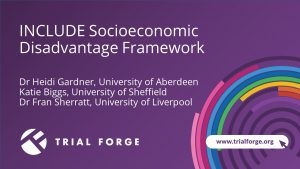
The NIHR INCLUDE Socioeconomic Disadvantage Framework launched on 24th January via a webinar.
This framework has been designed to aid researchers, who are designing clinical trials, to consider barriers to including patients from socioeconomically disadvantaged backgrounds in their trial.
Socioeconomically disadvantaged refers to people living in less favourable social and economic circumstances than others in the same society. This is more than just low income, it’s the combination of various situations and experiences that can change over time, and describes the impact of a complex multidimensional problem that encompasses the social injustices and inequalities that contribute to further inequalities for people in our society that are already at their most vulnerable.
The framework can also help researchers to develop strategies to attempt to address such barriers in order to improve the design and conduct of clinical research. Although this framework was developed with UK-based clinical trials in mind, aspects may also be relevant to different types of research and research conducted in populations outside of the UK. Whilst this framework focuses on socioeconomic disadvantage, the list of underserved groups in clinical research is extensive and researchers need to be aware of this when identifying barriers to research and developing to strategies to address barriers.
The recording of the webinar, slides and the framework itself are available here.
Your local branch of the NIHR RDS (Research Design Service) is based within the BU Clinical Research Unit (BUCRU) If you need help with patient and public involvement (PPI) or any other aspect of your grant application, don’t hesitate to get in touch in the new year.
We advise on all aspects of developing an application and can review application drafts as well as put them to a mock funding panel (run by RDS South West) known as Project Review Committee, which is a fantastic opportunity for researchers to obtain a critical review of a proposed grant application before this is sent to a funding body or if you’re hoping to resubmit the panel can provide some excellent tips and feedback.
Contact us as early as possible to benefit fully from the advice
Feel free to call us on 01202 961939 or send us an email
The Poverty Truth Commission to present at next Community Voices Webinar
Wednesday 8th February 2023 – 12pm to 1pm
February’s webinar welcomes The Poverty Truth Commission for Bournemouth Christchurch and Poole.
A Poverty Truth Commission (PTC) seeks to disrupt the power balance of the status quo by creating the conditions such that those with lived experience of poverty can take centre stage in decision making processes. A PTC is an invitation to individuals to become part of the solution to systemic failures and injustices. The PTC for Bournemouth, Christchurch and Poole has twelve Community Commissioners who volunteer their time in this role and they have been working with a similar number of local Civic/Business leaders since July 2022. They will be taking forward three themes to focus on for the duration of the project until July 2023. What if…? Change is Possible?
Community voices is a collaboration between BU PIER partnership and Centre for Seldom Heard Voices to provide a platform and a voice to local community activists.
Please do join us for this webinar….
Microsoft Teams meeting
Click here to join the meeting
Meeting ID: 327 243 890 723
Passcode: Gr5inu
The PhD viva and then….
 Today the Journal of Education and Research published online our paper ‘Reflections on Variations in PhD Viva Regulations: “And the Options Are …”’. [1] The paper outlines that examining PhD research in the form of a doctoral thesis is specialist work, which is why few people know the potential variations. This paper highlights the different options that are available for PhD examiners. There are four general options: (1) pass, (2) rewrite and resubmit; (3) lower degree, with or without resubmission; and (4) fail the PhD. However, from our experience, of both being examined for our own PhDs and examining others at a range of different universities, we have noted a considerable variety in detail within these common options. This paper outlines a variety of outcomes of a PhD examination, followed by four short case studies, each reflecting on a particular aspect /differences we experienced as examinees or as examiners. This paper further aims to alert PhD candidates and examiners to study the examination rules set by the awarding university, as the details of the PhD examination outcome, and hence the options available to both examiners and the students may differ more than one might expect.
Today the Journal of Education and Research published online our paper ‘Reflections on Variations in PhD Viva Regulations: “And the Options Are …”’. [1] The paper outlines that examining PhD research in the form of a doctoral thesis is specialist work, which is why few people know the potential variations. This paper highlights the different options that are available for PhD examiners. There are four general options: (1) pass, (2) rewrite and resubmit; (3) lower degree, with or without resubmission; and (4) fail the PhD. However, from our experience, of both being examined for our own PhDs and examining others at a range of different universities, we have noted a considerable variety in detail within these common options. This paper outlines a variety of outcomes of a PhD examination, followed by four short case studies, each reflecting on a particular aspect /differences we experienced as examinees or as examiners. This paper further aims to alert PhD candidates and examiners to study the examination rules set by the awarding university, as the details of the PhD examination outcome, and hence the options available to both examiners and the students may differ more than one might expect.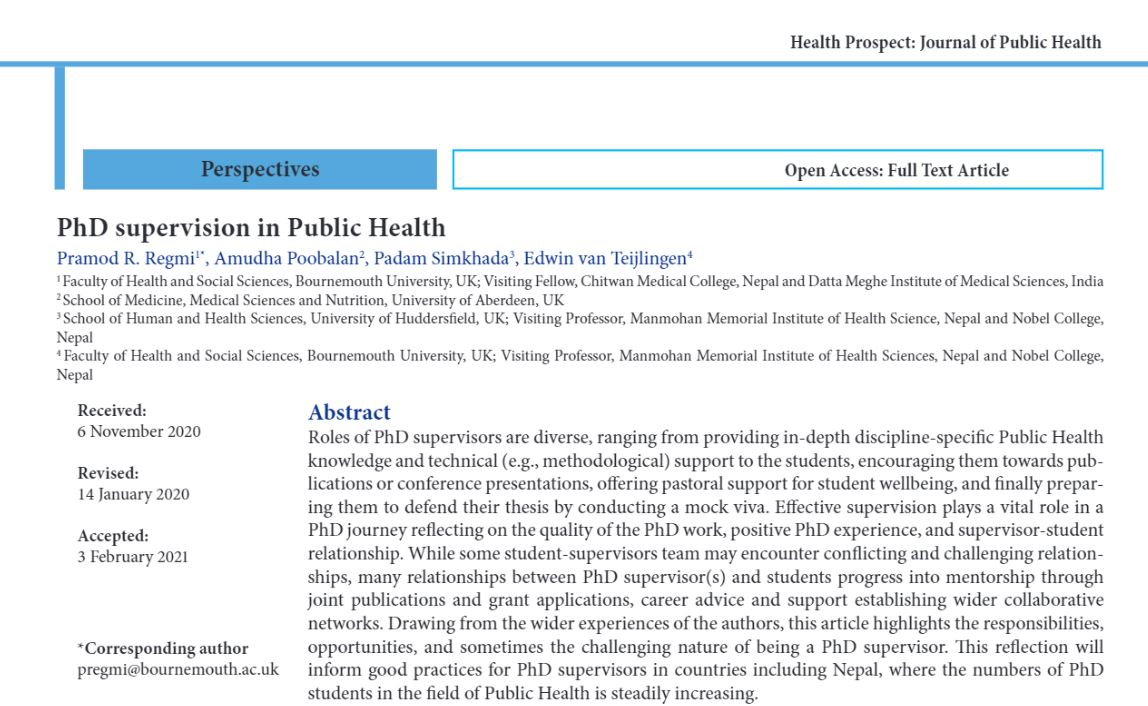
This publication adds to our earlier work on the roles of PhD supervisors providing in-depth discipline-specific Public Health knowledge and technical (e.g., methodological) support to the students, encouraging them towards publications or conference presentations, offering pastoral support for student wellbeing, and finally preparing them to defend their thesis by conducting a mock viva. Our earlier paper focused on the responsibilities, opportunities, and sometimes the challenging nature of being a PhD supervisor in the field of Public Health in Nepal. [2]
Prof. Edwin van Teijlingen
CMMPH
References:
- van Teijlingen, E., Simkhada, B., Regmi, P. ., Simkhada , P. ., Hundley, V. ., Poudel, K. C. (2022). Reflections on Variations in PhD Viva Regulations: “And the Options Are …”. Journal of Education and Research, 12(2), 61-74. https://doi.org/10.51474/jer.v12i2.624
- Regmi, P., Poobalan, A., Simkhada, P., van Teijlingen, E. (2021). PhD supervision in public health. Health Prospect, 20(1), 1-4.
It is all about experience
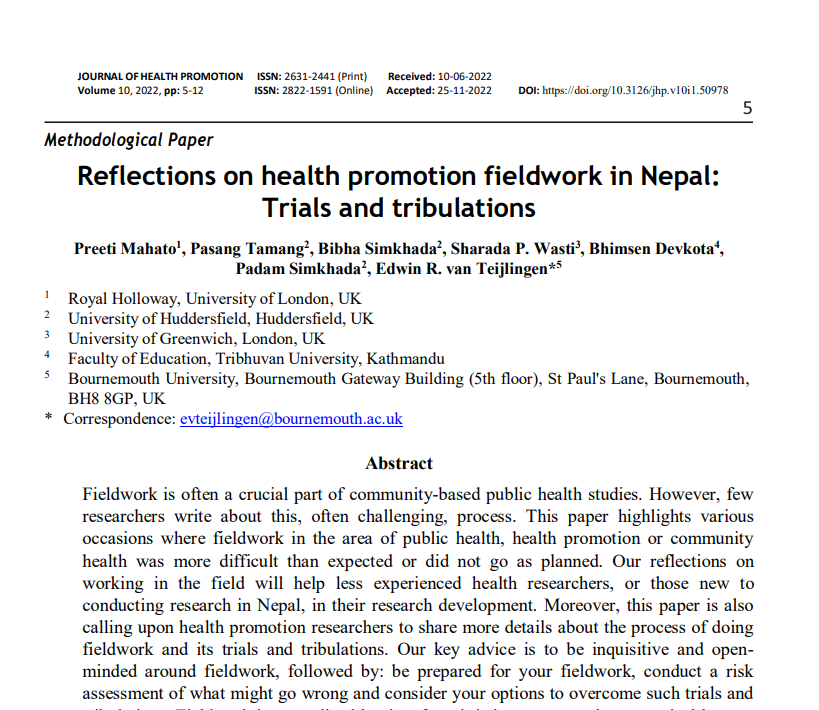 This week we published a paper on the experience of conducting fieldwork in the public health field in the Journal of Health Promotion. [1] Fieldwork is usually a crucial part of PhD research, not only in the health field. However, few researchers write about this, often challenging, process. This paper highlights various occasions where fieldwork in the area of public health, health promotion or community health was more difficult than expected or did not go as planned. Our reflections on working in the field are aimed at less experienced researchers to support them in their research development. Moreover, this paper is also calling upon health researchers to share more details about the process of doing fieldwork and its trials and tribulations. Our key advice is to be inquisitive and open-minded around fieldwork, followed by: be prepared for your fieldwork, conduct a risk assessment of what might go wrong, and consider your resources and options to overcome such trials and tribulations. Fieldwork can be unpredictable. We believe it is important to share practical lessons from the field which helps other to better understand these tribulations, and learn from them. Finally, sharing such information may guide new researchers and help them identify strategies that can address those issues and challenges in their future studies.
This week we published a paper on the experience of conducting fieldwork in the public health field in the Journal of Health Promotion. [1] Fieldwork is usually a crucial part of PhD research, not only in the health field. However, few researchers write about this, often challenging, process. This paper highlights various occasions where fieldwork in the area of public health, health promotion or community health was more difficult than expected or did not go as planned. Our reflections on working in the field are aimed at less experienced researchers to support them in their research development. Moreover, this paper is also calling upon health researchers to share more details about the process of doing fieldwork and its trials and tribulations. Our key advice is to be inquisitive and open-minded around fieldwork, followed by: be prepared for your fieldwork, conduct a risk assessment of what might go wrong, and consider your resources and options to overcome such trials and tribulations. Fieldwork can be unpredictable. We believe it is important to share practical lessons from the field which helps other to better understand these tribulations, and learn from them. Finally, sharing such information may guide new researchers and help them identify strategies that can address those issues and challenges in their future studies.
Dr. Preeti Mahato (at Royal Holloway, University of London), Dr Bibha Simkhada and Prof. Padam Simkhada (both based at the University of Huddersfield) are all BU Visiting Faculty. Moreover, I have had the pleasure of acting as PhD supervisor for five of my co-authors. I have included in this blog what is probably my favourite fieldwork photo taken a decade ago by former BU PhD student Dr. Sheetal Sharma.
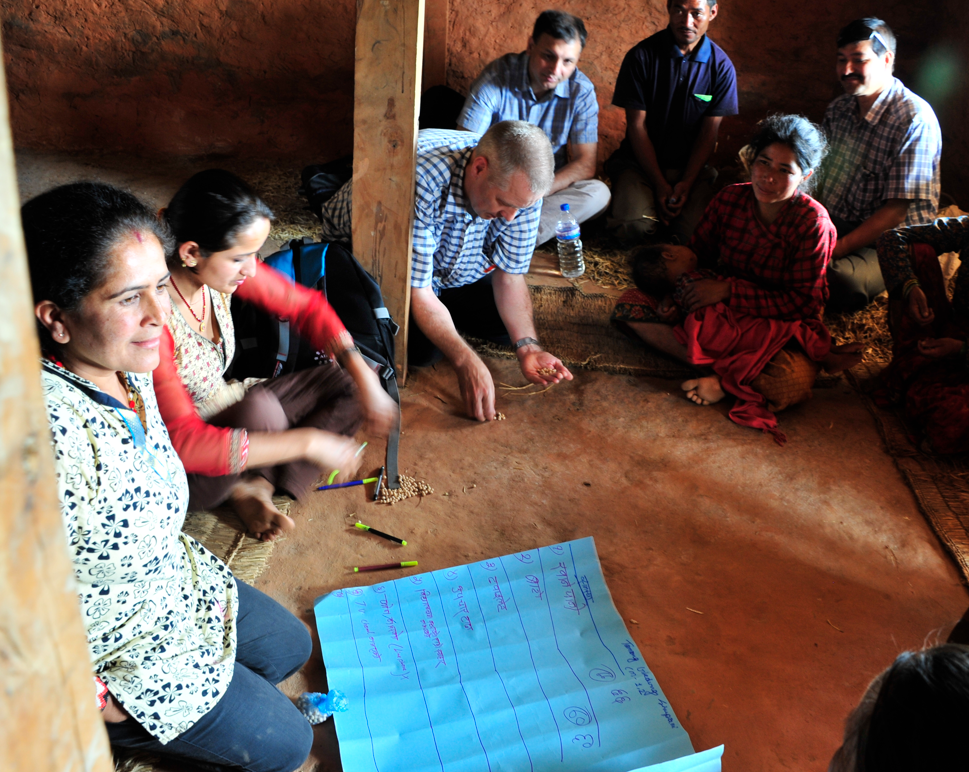
Prof. Edwin van Teijlingen
CMMPH (Centre for Midwifery, Maternal & Perinatal Health)
References:
- Mahato, P., Tamang, P., Simkhada, B., Wasti, S. P., Devkota, B., Simkhada, P., van Teijlingen, E.R. (2022) Reflections on health promotion fieldwork in Nepal: Trials and tribulations. Journal of Health Promotion 10(1): 5–12. https://doi.org/10.3126/jhp.v10i1.50978
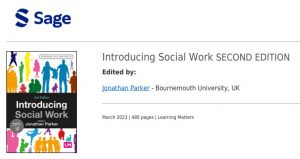
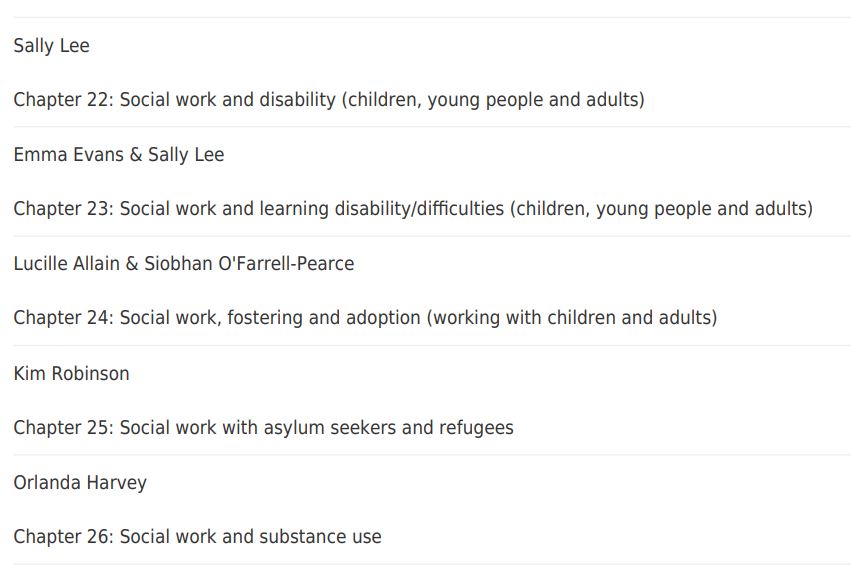
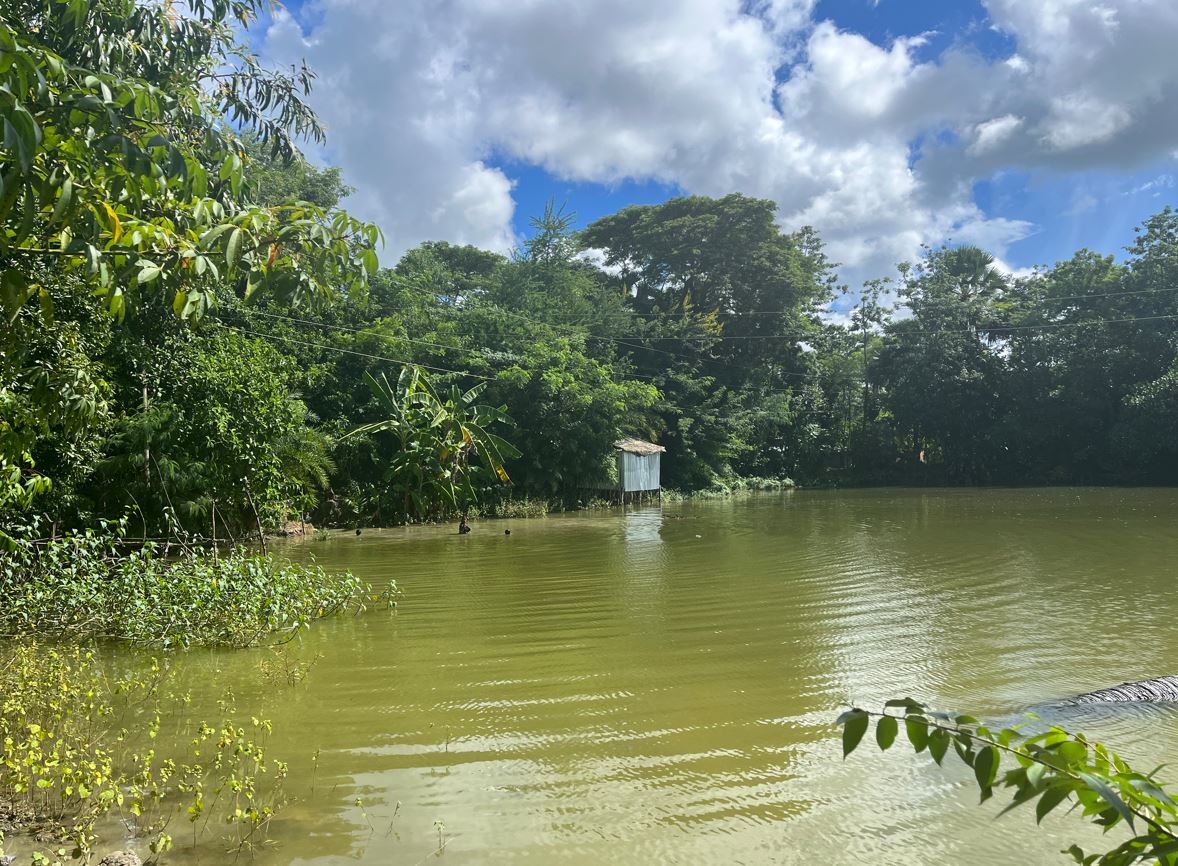












 Writing policy briefs
Writing policy briefs Upholding Excellence: The Concordat to Support Research Integrity
Upholding Excellence: The Concordat to Support Research Integrity Today’s Documentation Will Serve Tomorrow’s Justice
Today’s Documentation Will Serve Tomorrow’s Justice Up2U: New BU academic publication
Up2U: New BU academic publication New BU midwifery paper
New BU midwifery paper ECR Funding Open Call: Research Culture & Community Grant – Application Deadline Friday 12 December
ECR Funding Open Call: Research Culture & Community Grant – Application Deadline Friday 12 December MSCA Postdoctoral Fellowships 2025 Call
MSCA Postdoctoral Fellowships 2025 Call ERC Advanced Grant 2025 Webinar
ERC Advanced Grant 2025 Webinar Horizon Europe Work Programme 2025 Published
Horizon Europe Work Programme 2025 Published Horizon Europe 2025 Work Programme pre-Published
Horizon Europe 2025 Work Programme pre-Published Update on UKRO services
Update on UKRO services European research project exploring use of ‘virtual twins’ to better manage metabolic associated fatty liver disease
European research project exploring use of ‘virtual twins’ to better manage metabolic associated fatty liver disease